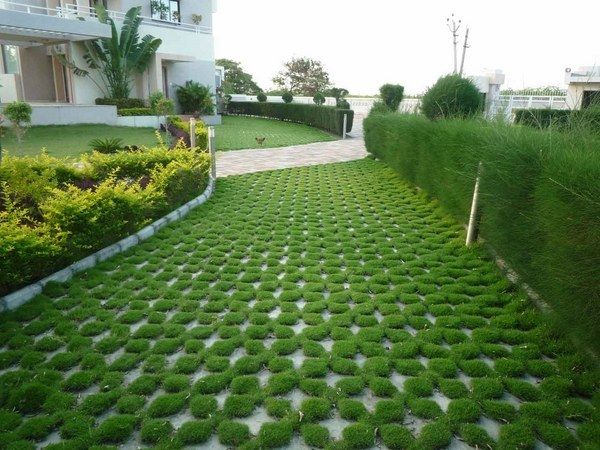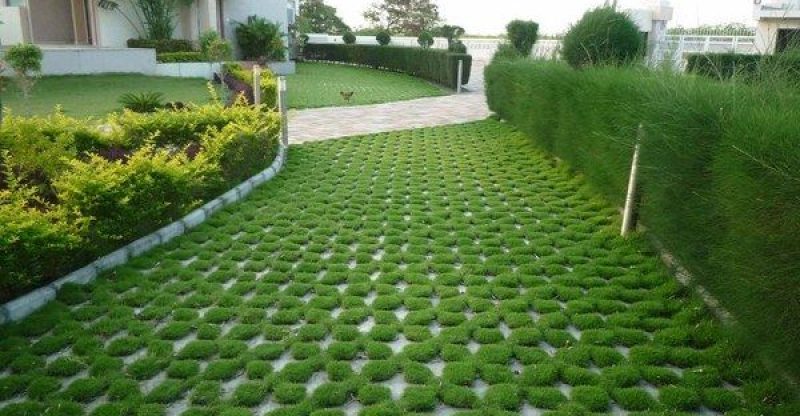Enhancing Outdoor Spaces: The Practical Benefits of Grass Pavers

Grass pavers, also known as turf pavers or permeable pavers, offer a versatile solution for enhancing outdoor spaces while promoting environmental sustainability. These innovative paving systems combine the structural integrity of traditional pavers with the aesthetic appeal and ecological benefits of natural grass. Whether used in residential driveways, commercial parking lots, or landscaped pathways, Grass pavers (Rasengittersteine) provide numerous practical advantages that contribute to a functional and visually appealing outdoor environment.
1. Eco-Friendly Stormwater Management
One of the primary benefits of grass pavers is their ability to manage stormwater effectively. Unlike impermeable surfaces such as concrete or asphalt, grass pavers allow rainwater to infiltrate through the paved surface and into the underlying soil. This natural infiltration reduces runoff, minimizes erosion, and helps replenish groundwater supplies. By promoting water absorption and filtration, grass pavers contribute to sustainable urban drainage systems (SUDS) and support local water quality initiatives.
2. Improved Soil Health and Microclimate
Grass pavers promote healthier soil conditions by facilitating air exchange and water infiltration, which are essential for robust plant growth. The permeable design prevents soil compaction compared to traditional paving materials, allowing roots to penetrate deeper and access nutrients more effectively. Additionally, the presence of grass or vegetation within the paver system helps moderate surface temperatures, creating a cooler microclimate in urban and residential settings.
3. Enhanced Aesthetic Appeal
Combining the structural stability of pavers with the natural beauty of grass, turf pavers enhance the aesthetic appeal of outdoor spaces. They can be seamlessly integrated into existing landscapes, providing a green alternative to conventional paving materials. Grass pavers offer design versatility, allowing for creative patterns, borders, and configurations that complement architectural styles and landscaping themes. Whether used for driveways, walkways, or patio areas, grass pavers add visual interest and curb appeal while promoting environmental stewardship.
4. Durability and Load-Bearing Capacity
Grass pavers are engineered to withstand heavy loads and vehicular traffic while supporting healthy turf growth. Made from durable materials such as recycled plastics or concrete, these pavers distribute weight evenly across the surface, reducing soil compaction and preventing rutting. This structural resilience makes grass pavers suitable for high-traffic areas such as parking lots, fire lanes, and emergency access routes, offering long-term performance and cost-effective maintenance.
5. Noise Reduction and Thermal Insulation
The combination of grass and paver materials provides acoustic benefits by absorbing sound waves and reducing noise pollution in urban environments. Grass pavers act as natural sound barriers, mitigating traffic noise and enhancing outdoor comfort for residents and visitors alike. Furthermore, the thermal insulation properties of grass pavers help regulate surface temperatures, reducing heat island effects and improving overall environmental comfort in paved areas.
6. Low-Maintenance Landscaping Solution
Maintaining grass pavers is straightforward and requires minimal upkeep compared to traditional turf or hardscape surfaces. Routine maintenance includes mowing, fertilizing, and occasional irrigation to preserve the health and appearance of the grass cover. Weed growth can be managed through regular monitoring and spot treatments, ensuring a clean and well-maintained outdoor environment year-round. Grass pavers also eliminate the need for extensive snow removal in colder climates, as the permeable surface allows snow to melt and infiltrate naturally.
7. Environmental Compliance and LEED Certification
Grass pavers contribute to sustainable building practices and may qualify for LEED (Leadership in Energy and Environmental Design) certification credits. By reducing stormwater runoff, promoting green infrastructure, and enhancing site biodiversity, grass pavers align with environmentally responsible development standards. These sustainable attributes appeal to homeowners, businesses, and municipalities seeking to achieve green building certifications and demonstrate commitment to environmental stewardship.
In conclusion, grass pavers offer practical benefits that enhance outdoor spaces through eco-friendly stormwater management, improved soil health, enhanced aesthetic appeal, durability, noise reduction, thermal insulation, and low-maintenance landscaping solutions. Whether enhancing residential properties or commercial developments, grass pavers provide a sustainable paving option that balances functional performance with environmental responsibility. Incorporating grass pavers into outdoor design projects supports sustainable urban development goals and contributes to creating resilient, attractive, and environmentally friendly outdoor environments.






